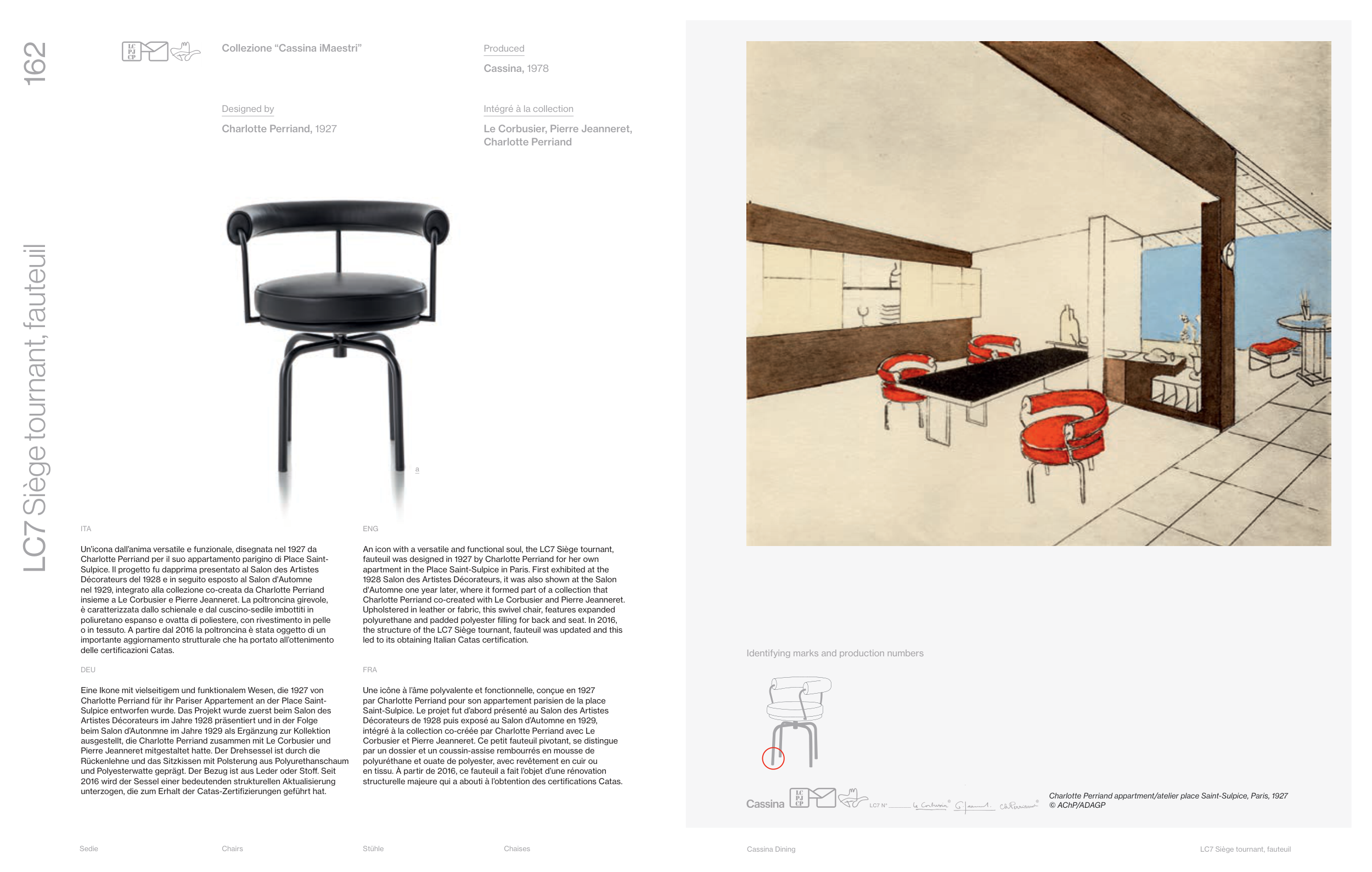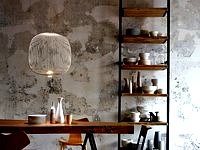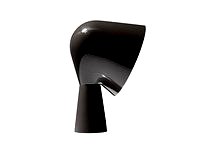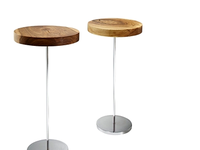ITA
ENG
DEU
FRA
LC7 Siège tournant, fauteuil
LC1 N° ____________
LC2 N° ____________
LC3 N° ____________
LC4 N° ____________
LC5 N° ____________
LC6 N° ____________
LC7 N° ____________
LC8 N° ____________
LC9 N° ____________
LC10–P N° ____________
LC11–P N° ____________
LC12 N° ____________
LC14 N° ____________
LC15 N° ____________
LC16 N° ____________
LC17 N° ____________
LC20 N°
____________
Designed by
Charlotte Perriand, 1927
Intégré à la collection
Le Corbusier, Pierre Jeanneret,
Charlotte Perriand
Produced
Cassina, 1978
Collezione “Cassina iMaestri”
a
Un’icona dall’anima versatile e funzionale, disegnata nel 1927 da
Charlotte Perriand per il suo appartamento parigino di Place Saint-
Sulpice. Il progetto fu dapprima presentato al Salon des Artistes
Décorateurs del 1928 e in seguito esposto al Salon d'Automne
nel 1929, integrato alla collezione co-creata da Charlotte Perriand
insieme a Le Corbusier e Pierre Jeanneret. La poltroncina girevole,
è caratterizzata dallo schienale e dal cuscino-sedile imbottiti in
poliuretano espanso e ovatta di poliestere, con rivestimento in pelle
o in tessuto. A partire dal 2016 la poltroncina è stata oggetto di un
importante aggiornamento strutturale che ha portato all’ottenimento
delle certificazioni Catas.
An icon with a versatile and functional soul, the LC7 Siège tournant,
fauteuil was designed in 1927 by Charlotte Perriand for her own
apartment in the Place Saint-Sulpice in Paris. First exhibited at the
1928 Salon des Artistes Décorateurs, it was also shown at the Salon
d'Automne one year later, where it formed part of a collection that
Charlotte Perriand co-created with Le Corbusier and Pierre Jeanneret.
Upholstered in leather or fabric, this swivel chair, features expanded
polyurethane and padded polyester filling for back and seat. In 2016,
the structure of the LC7 Siège tournant, fauteuil was updated and this
led to its obtaining Italian Catas certification.
Eine Ikone mit vielseitigem und funktionalem Wesen, die 1927 von
Charlotte Perriand für ihr Pariser Appartement an der Place Saint-
Sulpice entworfen wurde. Das Projekt wurde zuerst beim Salon des
Artistes Décorateurs im Jahre 1928 präsentiert und in der Folge
beim Salon d’Autonmne im Jahre 1929 als Ergänzung zur Kollektion
ausgestellt, die Charlotte Perriand zusammen mit Le Corbusier und
Pierre Jeanneret mitgestaltet hatte. Der Drehsessel ist durch die
Rückenlehne und das Sitzkissen mit Polsterung aus Polyurethanschaum
und Polyesterwatte geprägt. Der Bezug ist aus Leder oder Stoff. Seit
2016 wird der Sessel einer bedeutenden strukturellen Aktualisierung
unterzogen, die zum Erhalt der Catas-Zertifizierungen geführt hat.
Une icône à l’âme polyvalente et fonctionnelle, conçue en 1927
par Charlotte Perriand pour son appartement parisien de la place
Saint-Sulpice. Le projet fut d’abord présenté au Salon des Artistes
Décorateurs de 1928 puis exposé au Salon d’Automne en 1929,
intégré à la collection co-créée par Charlotte Perriand avec Le
Corbusier et Pierre Jeanneret. Ce petit fauteuil pivotant, se distingue
par un dossier et un coussin-assise rembourrés en mousse de
polyuréthane et ouate de polyester, avec revêtement en cuir ou
en tissu. À partir de 2016, ce fauteuil a fait l’objet d’une rénovation
structurelle majeure qui a abouti à l’obtention des certifications Catas.
Charlotte Perriand appartment/atelier place Saint-Sulpice, Paris, 1927
© AChP/ADAGP
LC1 N° ____________
LC2 N° ____________
LC3 N° ____________
LC4 N° ____________
LC5 N° ____________
LC6 N° ____________
LC7 N° ____________
LC8 N° ____________
LC9 N° ____________
LC10–P N° ____________
LC11–P N° ____________
LC12 N° ____________
LC14 N° ____________
LC15 N° ____________
LC16 N° ____________
LC17 N° ____________
LC20 N°
____________
Identifying marks and production numbers
162
LC7 Siège tournant, fauteuil
Cassina Dining
Sedie
Chairs
Stühle
Chaises























































































































































































































